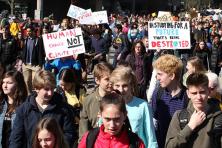The Oregon Legislature’s failure this year to pass a state-wide cap-and-trade program has been interpreted by some as an indication of tensions between rural and urban communities. The way the controversy unfolded shone light on a different divide: between older voters who see environmental protections as a threat to the economy, and underage youth activists who see the climate crisis as an existential threat to their future.
During the fight for the Clean Energy Jobs Act, young people met with the governor to ask for her support. They walked out of school, led rallies and protests, and lobbied their politicians. When Republican Senators walked out, young people massed at the Oregon State Capitol in support of the bill. We shouldn’t be surprised by their passionate and informed advocacy; after adopting Next Generation Science Standards in 2014, Oregon schools introduce students to the topic of climate change in 6th grade. High school science classes emphasize the subject. By next spring, nearly 200,000 young Oregonians will have graduated high school since implementing these standards – and they will be able to vote.
A recent study showed that children can have a significant effect on their parents’ views around climate change, with the biggest shifts seen in more conservative families. Regardless of the latest disappointing outcome for climate action in Oregon, we are already seeing a generational shift towards political will for climate action. More can be done to encourage this shift; Washington State legislators this year considered a bill which, if passed, would have provided grants for climate science education and increased the requirements around climate education.
An understanding of climate change is a crucial foundation for climate action. It also can and must inform a wide range of policy decisions moving forward. Urban development, rural services, agriculture, transportation – it is already impossible to bracket off climate change from these issue areas, as virtually every aspect of modern life will be affected by the climate crisis. Here, too, is the intergenerational tension, as young people develop their own worldviews and ways of doing things, coming into conflict with those comfortable with the status quo.
Climate change is an existential threat to humanity, and the younger generations are those who will have to live with it. There are many who feel that young people too inexperienced in the ways of the world to have credible political views. But today’s decisionmakers ought not disregard the merits of young people’s learning: to combat the climate crisis, we will need fresh new ideas and the political willpower to implement them. Young people can give us both. Shouldn’t they be given a voice in their future?



